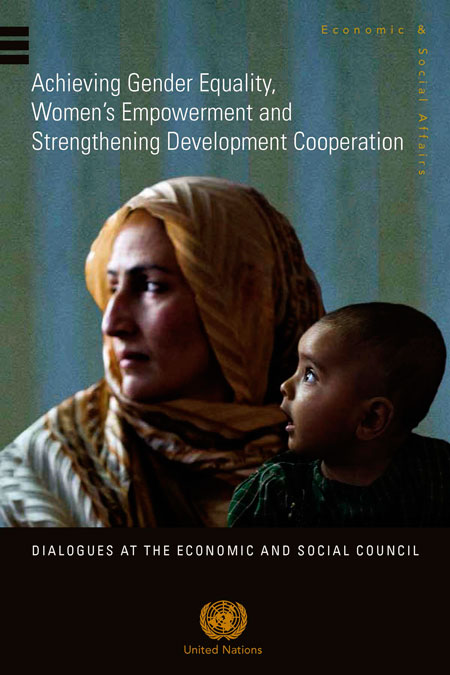| Autores | Título | Documento Digital | Resumen |
|---|
Hamidon Ali |
Translating words to deeds: Achieving gender equality and development for all | LEXTN-01-Hamidon.pdf (205.82 KB) | Resumen |
| | | |
The 2010 High-level Segment is an occasion to focus on some of the most pressing issues in development, now made more challenging by the subdued pace of economic recovery. Recent experience proves that this is particularly true for gender equality and the empowerment of women. |
Ban, Ki-Moon |
Increasing uniform delivery through collective action | LEXTN-02-Ban.pdf (130.5 KB) | Resumen |
| | | |
As we meet, the world is still grappling with the aftershocks of multiple crises. The financial, food and climate crises have set back efforts towards the Millennium Development Goals and threaten future progress. We live under the shadow of continued global financial and economic uncertainty. The recovery from the most severe recession in recent history has been tentative and uneven. It cannot compensate for the losses suffered. |
Bachelet, Michelle |
Women`s rights as human rights | LEXTN-03-Bachelet.pdf (138.17 KB) | Resumen |
| | | |
We must reserve our utmost fervent solidarity for women, who find themselves in situations of subjugation and, in some cases, slavery. We must always say it loud and clear that human rights are universal and gender equality as an expression of those rights is universal as well so women's rights are human rights. No philosophical, political, religious or other reasons can justify the violation of these fundamental ideals and this is the type of globalization that we have to value to the utmost. I am convinced that, in order to put an end to these institutions, laws, and customs that perpetuate gender inequality the international community must carry out a monumental and consistent effort to break the inertia of injustice. |
Mitchell, Andrew |
Women empowerment: Lynchpin of development goals | LEXTN-04-Mitchell.pdf (132.7 KB) | Resumen |
| | | |
It is a great honour to address this year's opening session of the ECOSOC High-level Segment. I am particularly pleased that the focus of this meeting is gender equality and the role of women in development, peace, and security. This is what we view that we in the United Kingdom consider to be particularly important. I hope that over the next few days, the ideas we share and the commitments we make will stimulate a renewed international effort to support the opportunities, right, health, and status of women and girls around the world. |
Moushira Khattab |
Reviewing ongoing progress in women empowerment and gender equality | LEXTN-05-Moushira.pdf (139.06 KB) | Resumen |
| | | |
Egypt highly appreciates the efforts of ECOSOC and values the focus of this Substantive session on gender equality and empowerment of women, a huge challenge still facing global community and an indispensible requirement for sustainable development. Egypt is eager to utilize its current ECOSOC membership to further enhance its much appreciated efforts in this regard. |
Stewart, Francés |
The fourth domain for gender equality: Decision-making and power | LEXTN-06-Stewart.pdf (141.96 KB) | Resumen |
| | | |
There has been progress towards meeting the goal of promoting gender inequality and the empowerment of women but important gaps remain; and this progress is being threatened by several intersecting crises, such as the world financial crisis and recession and threats to food security, under the looming shadow of climate change and the crisis of human rights and security. |
Sha, Zukang |
The world economic recovery and the way forward | LEXTN-07-Sha.pdf (140.73 KB) | Resumen |
| | | |
According to our recently published World Economic Situation and Prospects, as of mid-2010, the world economy contracted by 2.0 per cent in 2009. It is expected to grow by 3.0 per cent in 2010 and 3.1 per cent in 2011. While this is encouraging, this pace of the recovery is far from sufficient. It cannot make strong dents in the employment sector. With so many people still without jobs, we cannot expect a quick recovery in private consumption and investment demand. The recovery is also uneven. Growth prospects for some Asian developing countries are good but many other developing countries are still suffering from the fallout. Their economies are growing far below potential. Growth in most developed economies is lacklustre. |
Supachai, Panitchpakdi |
Overcoming economic weaknesses and getting back on track to MDG attainment | LEXTN-08-Supachai.pdf (128.03 KB) | Resumen |
| | | |
The economic recovery has been deeply fragile and highly uneven, driven by artificial demand created by the huge fiscal stimulus in response to the economic crisis. In order to craft policies to overcome persisting weaknesses, the right understanding of the crisis and recovery is necessary. |
